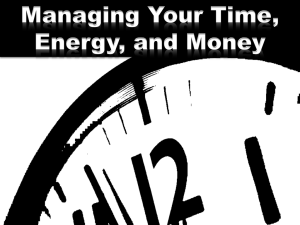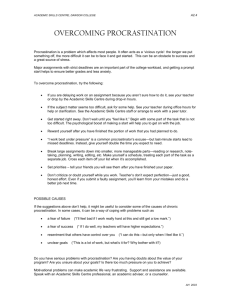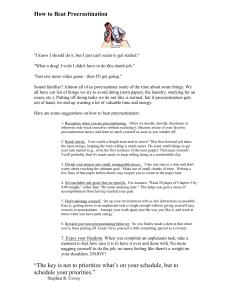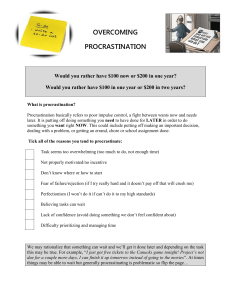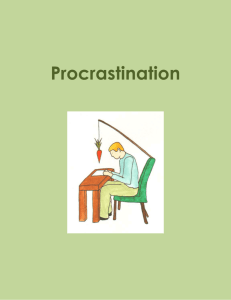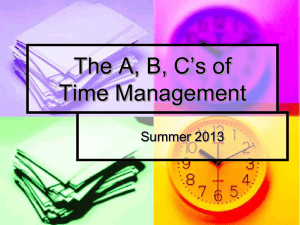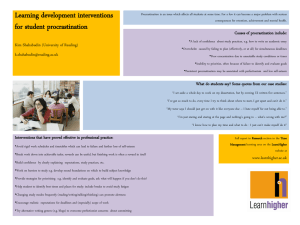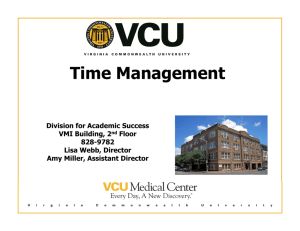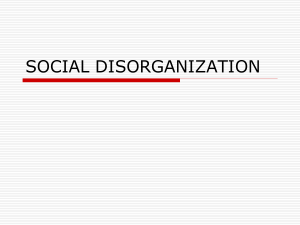Is This Stress?
advertisement
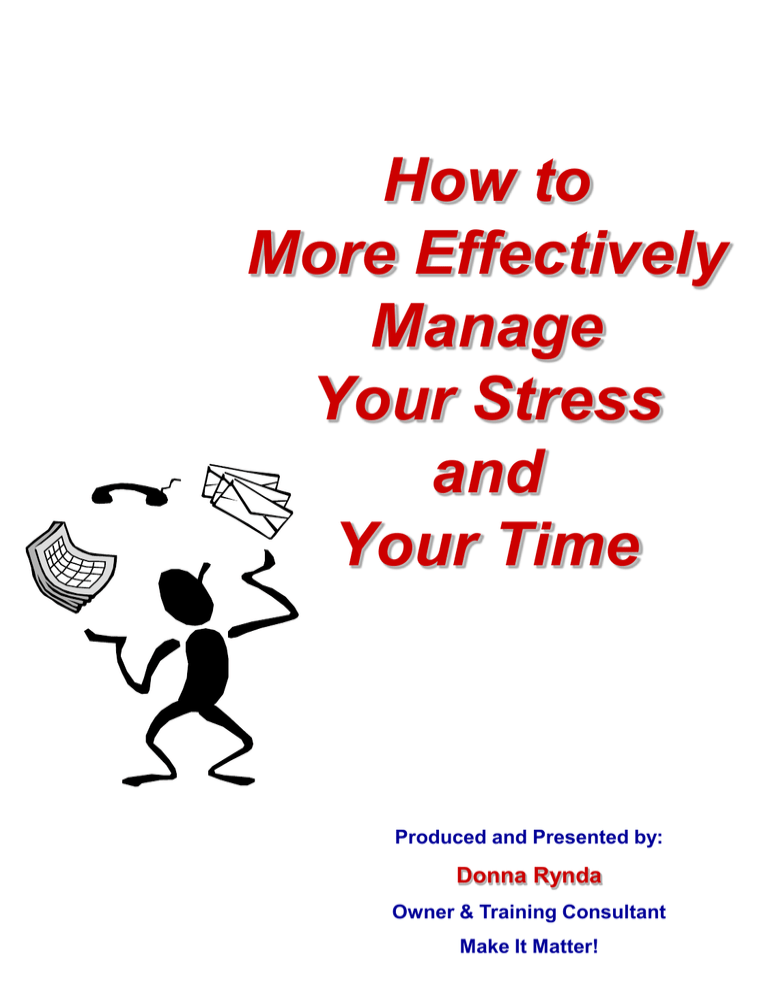
How to More Effectively Manage Your Stress and Your Time Produced and Presented by: Donna Rynda Owner & Training Consultant Make It Matter! Session Objectives … Explain how stress management can affect time management Name the four free ways to reduce our stressful tension Identify the two vitamins critical for handling daily stresses Complete a stress-management team quiz & a time-management self- assessment questionnaire Recite the 10-word question that proactive time managers ask themselves throughout the day List the Five P’s that can block effective time management Stress Management = Time Management (and vice versa) Is This Stress? Instructions: Check all the situations that you would consider to be stressful. Waiting in traffic Waiting for the birth of a child Playing a baseball game Watching a baseball game Getting fired Getting promoted Shopping for Christmas gifts Unwrapping Christmas gifts Running a red light Going to jail Finding out you’re adopted Finding out you’re a millionaire Fighting with your spouse Making up with your spouse What Is Stress? STRESS: Our ____________ responses to __________ pressures. (aka: the __________) Eustress = ___________ stress Distress = ___________ stress Action of any kind causes stress. Stress _________ energy! It is a natural and ____________ life force. Research has proven that … Dealing with stress in a negative manner can actually demoralize us -- and _______ our health. Dealing with stress in a positive manner can energize us -- and ________ our health. The Stress Test The Four Free Ways to Reduce Stressful Tension: B___________ L___________ W________ W_________ Laughter is the Best Medicine! According to American Health Magazine – “When laughter bursts, your metabolism picks up, muscles get massaged and neurochemicals stream into the blood. You feel relaxed. And you’ve raised your guard against depression, heart disease, and pain. Researchers now believe that laughter empowers the immune system as well.” The Four Factors of Stress Management: Relaxation T____________ D______ E__________ Support S______________ *********************************** Foods That Invite Stress Foods That Fight Stress _____________________________ Can we really manage time? “No way! No matter what you do, you really cannot m_______ time. You can’t slow it down or speed it up. All you can do is control how you s_______ it.” -- Mark Ellwood President of Pace Productivity How Wisely Do I “Spend” My Time? 0 = rarely; 2 = sometimes; 4 = often 1. 2. 3. 4. 5. 6. 7. 8. 9. 10. 11. 12. 13. 14. 15. 16. 17. 18. 19. 20. 21. 22. Do I write “to-do” lists? Do I prioritize my “to-do” lists according to which items have the highest payoff for me? Do I finish all the items on my “to-do” list on a daily basis? Do I update – in writing – my professional and personal goals? Is my desk clean and organized? Do I put everything in its place? Do I effectively deal with interruptions? Can I easily find items in my files? Do I practice assertive/confident communication skills? Do I allow myself quiet time during which I can work undisturbed? Do I deal effectively with long-winded callers? Do I focus on preventing problems? Do I make the best use of my time? Do I meet deadlines with time to spare? Do I practice punctuality in regards to work, meetings, and professional events? Do others know the best times to reach me? When I’m interrupted, can I return to my work without losing too much momentum? Do I do something every day to move me closer to my longrange professional and/or personal goals? Can I relax during my free time without worrying about work? Do I do my most important work during my peak energy hours? Do I begin and finish projects on time? Can others carry on most of my responsibilities when I’m absent from work? The Question ALL Proactive Time Managers Ask Often: What is the b____ u____ of my time r_____ n____? The Five P’s that Block Time Management ************************************* BLOCK #1 P_______________ Procrastination: Use a “_____” list – and update it on a regular basis. Implement the “Swiss cheese” __________ to those big projects/assignments. Tackle the __________ and/or unpleasant tasks first. Just do it! Focus on ________ tasks rather than finishing them. Take that first step! Reward ________ when the job is (finally) done. The Five P’s that Block Time Management ************************************* BLOCK #2 P_______ D___________ Procrastination Paperwork Disorganization: Organize your ______ area and your _______. An organized workplace has been proven to reduce stress and increase productivity. Make it easy for you (and/or your colleagues) to ______ what you want when you want it by __________ everything back in its place. Fat ______ waste _______. The Five P’s that Block Time Management *********************************** BLOCK #3 P______ T______ Paperwork Disorganization Procrastination Phone Trauma: Discover the best times to _______ _______ and let them know the best times to _____ _____. Would an _____ be more time-efficient? Return calls during your ______ productive times. It takes very little _________ to return calls and/or answer questions. Stand ___ when ______ on the phone. A recent study proved that the brain’s processing speed increases as much as 20% while standing! Answer your phone with this question: “Hello – ____ may I help you?” The Five P’s that Block Time Management ************************************ BLOCK #4 P_____ D______ Phone Trauma Paperwork Disorganization Procrastination People Drop-Ins: When people arrive to interrupt your schedule, _____ them at the ______ and talk outside your ________. When time is an issue, _______ your priority and make an ___________ for a future meeting. Stand ___! Visits don’t last long this way. Get rid of extra ______ in your office. You can always _____ one from somewhere else when necessary. The Five P’s that Block Time Management *********************************** BLOCK #5 P___ P______ & P_________ People Drop-Ins Phone Trauma Paperwork Disorganization Procrastination Poor Planning and Prioritization: The key to being proactive is to plan ____ ________. Plan your _____; _____ your plan. If you _____ to plan, you plan to ______. If you can’t _________ it, then you can’t _________ it! The single, greatest strategy in effective time management is to ___________ in relation to __________. Prioritize your projects and ______ on those that will matter the most to the most people! Throughout the day, ask yourself: “What is the _____ _____ of my time _____ _____?” Control vs. Non-Control ********************************* What I can’t control: What I can control: “While we cannot direct the wind, we can adjust the sails.” -- author unknown
